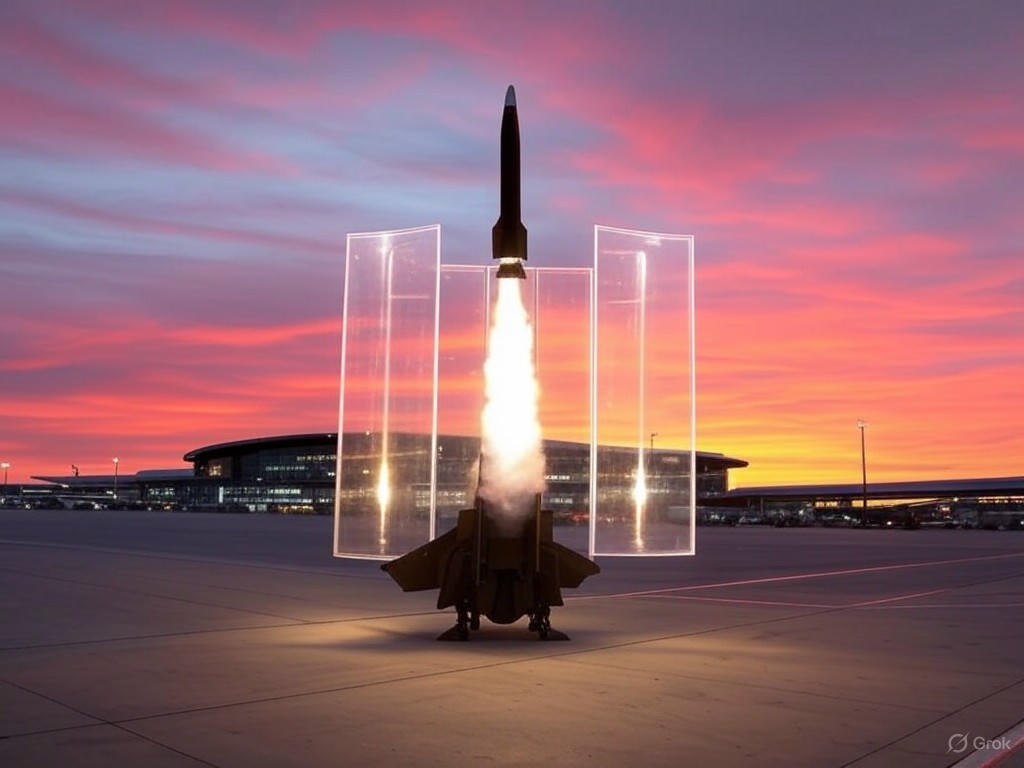
Houthi Attack on Israel Prompts Netanyahu’s Vow of Retaliation
Escalating Tensions: Houthi Missile Strikes Israel’s Main Airport
In a bold move that has rattled the region, Yemen’s Houthi rebels, backed by Iran, fired a ballistic missile at Israel’s Ben Gurion Airport on May 4, 2025. This incident quickly sparked Netanyahu retaliation promises, as the Israeli Prime Minister condemned the attack and vowed to respond forcefully. The missile hit near a parking lot at Terminal 3, leaving a crater but no major damage, yet it forced air raid sirens to blare and operations to halt temporarily.
Travelers scrambled for shelters as flights were grounded, and while the airport reopened within half an hour, the fallout lingered. Major airlines from Europe and the US canceled services for days, stranding passengers and highlighting how fragile air travel has become amid these conflicts. Have you ever wondered how a single strike can disrupt thousands of lives so quickly?
Netanyahu’s response was swift and stern, underscoring his commitment to Netanyahu retaliation against what he called the “Iranian terror masters.” In discussions with Cypriot President Nikos Christodoulides, he declared that Israel and the world face a shared threat from the Houthis and won’t stand idly by.
Netanyahu Retaliation: Linking the Attack to Iran
Prime Minister Netanyahu didn’t mince words, directly tying the Houthi actions to Iran and emphasizing the need for Netanyahu retaliation. He stated that Israel would act decisively against those responsible, including their backers in Tehran. This came shortly after the missile strike, amplifying global concerns about potential escalations.
Backing from US President Donald Trump added fuel to the fire, as Trump blamed Iran outright on social media, warning of severe consequences. Netanyahu echoed this on X, reinforcing that any Houthi moves are extensions of Iranian aggression, and Israel would choose the moment for its Netanyahu retaliation. It’s a reminder of how interconnected these alliances are—does this make you think about the domino effect in international relations?
By aligning with Trump’s stance, Netanyahu positioned Israel’s response as part of a broader pushback, promising actions that go beyond immediate defense to address the root causes.
The Houthi Campaign: A Growing Threat
The Houthis’ strike is part of their ongoing offensive against Israel, which has intensified since Israel’s Gaza operations resumed. Their military spokesman claimed a hypersonic missile hit, warning that Ben Gurion Airport is now unsafe—a direct challenge that could invite more Netanyahu retaliation. Since late March, they’ve launched around 27 missiles and drones, with only some reaching Israeli skies.
This group’s anti-Israel stance, rooted in their slogan of defiance, began ramping up after the October 7 Hamas attack. They’re positioning themselves as defenders of Palestinians, but at what cost? If you’re following global news, you might see how these actions are pulling in more players, potentially escalating into something bigger.
For everyday people, this means heightened travel risks and economic ripples, like disrupted supply chains. Experts suggest monitoring these developments could help travelers plan safer routes or even push for diplomatic solutions.
International Response and Military Escalations
The US, as Israel’s key ally, has ramped up airstrikes on Houthi targets in Yemen, directly supporting efforts to counter threats that might trigger Netanyahu retaliation. Recent US operations targeted Houthi infrastructure, aiming to dismantle their capabilities before they cause more harm. Israeli Defense Minister Israel Katz echoed this resolve, vowing harsh repercussions for any attacks.
Netanyahu hinted at coordinated “bangs” with US backing, suggesting a measured but firm approach to Netanyahu retaliation. This comes as Israel’s security cabinet debates expanding Gaza operations, adding layers to an already complex scenario. In times like these, it’s worth asking: How can international cooperation prevent conflicts from spiraling?
One strategy might be stronger diplomatic channels, like urging ceasefires through UN mediation, to avoid civilian casualties and economic fallout.
Impact on Daily Life and Travel Disruptions
The Ben Gurion strike created chaos, with videos showing panicked travelers rushing to safety amid wailing sirens. While operations resumed fast, the cancellations left many, like one passenger bound for Paris, in limbo—Air France and others grounded flights indefinitely. Netanyahu retaliation talks only heighten the uncertainty for those relying on these routes.
This event underscores how regional conflicts affect global mobility. Imagine planning a family trip only to have it derailed by geopolitical tensions—what would you do in that situation? Tips for travelers include checking real-time updates and having backup plans, such as alternative airports or flexible bookings.
Broader lessons here? Communities can build resilience by staying informed and supporting policies that promote peace.
Broader Context: The Gaza War’s Ripple Effects
At its core, the Houthi attacks stem from the Gaza conflict, ignited by Hamas’ October 7, 2023 assault that killed about 1,200 and took hostages. Israel reports around 59 captives still held, with many presumed dead, fueling ongoing operations that have led to over 52,000 Palestinian deaths. This tragedy has drawn in groups like the Houthis, prompting vows of Netanyahu retaliation.
With Gaza’s population displaced and facing hunger, solidarity actions from afar are complicating peace efforts. The Houthis frame their strikes as support for Palestinians, but critics argue it prolongs suffering. If you’re passionate about human rights, consider how advocating for humanitarian aid could make a difference.
One actionable step: Support organizations delivering food and medical supplies to affected areas, turning awareness into real impact.
Historical Roots of Houthi Involvement
The Houthis, or Ansar Allah, emerged during Yemen’s 2014 civil war, gaining control of key areas with Iranian aid. Their expansion into targeting Israel marks a shift, aligning them with the “Axis of Resistance” alongside groups like Hezbollah. This evolution has set the stage for potential Netanyahu retaliation, as their missile capabilities grow.
From Red Sea shipping attacks to direct strikes, they’re extending their reach, which raises questions about long-term stability. Think about it: How do smaller conflicts evolve into global threats, and what can history teach us? By learning from past interventions, policymakers might craft strategies to isolate extremists without full-scale wars.
For individuals, staying educated on these histories can inform better discussions and advocacy.
Potential Outcomes of Netanyahu Retaliation
With Netanyahu’s promises of retaliation at a “time and place of our choosing,” Israel may opt for strategic strikes rather than knee-jerk reactions. This approach could target Iranian assets, escalating the conflict and involving more nations. Iran denies direct involvement, but evidence points to their support, making Netanyahu retaliation a high-stakes gamble.
The attack’s timing, amid Gaza debates, might push for tougher Israeli stances. Analysts warn of miscalculations leading to broader wars, so what’s next? Perhaps increased diplomacy, like backchannel talks, could de-escalate tensions before it’s too late.
If you’re concerned, engage with campaigns promoting dialogue—small actions can amplify peace efforts.
Humanitarian and Diplomatic Challenges
Escalations are hindering ceasefire talks in Gaza, where aid is desperately needed amid multi-front threats from Hamas, Hezbollah, and the Houthis. US involvement in Yemen strikes highlights the international stakes, potentially drawing in more allies or adversaries. Netanyahu retaliation vows add pressure, complicating humanitarian access.
The risk of a wider conflict looms large, with civilians bearing the brunt. Ever considered how global citizens can influence outcomes? Supporting petitions or contacting representatives for balanced policies is a start.
This situation calls for creative solutions, like neutral zones for negotiations, to protect innocent lives.
Wrapping Up: Looking Ahead
As tensions simmer, the Houthi strike and Netanyahu retaliation promises signal a precarious future for the Middle East. Israel’s potential moves against Iran and the Houthis could reshape alliances and intensify humanitarian crises. We’re at a crossroads where diplomacy might still prevail, but only if all sides commit to dialogue.
What are your thoughts on this situation—do you believe targeted responses can lead to lasting peace? I’d love to hear your insights in the comments below, or check out our related posts on regional security for more context. Share this article if it resonated, and let’s keep the conversation going.
References
1. Netanyahu threatens Houthis and Iran, Times of Israel.
2. Missile fired by Houthis halts flights in Israel, PBS NewsHour.
3. Video source: Houthi missile attack footage, YouTube.
4. US strikes on Houthi targets, The Jerusalem Post.
Netanyahu retaliation, Houthi missile attack, Iran involvement, Ben Gurion Airport strike, Israel security threats, Yemen conflict escalation, Middle East tensions, Gaza war impacts, Houthi campaign against Israel, US military response






